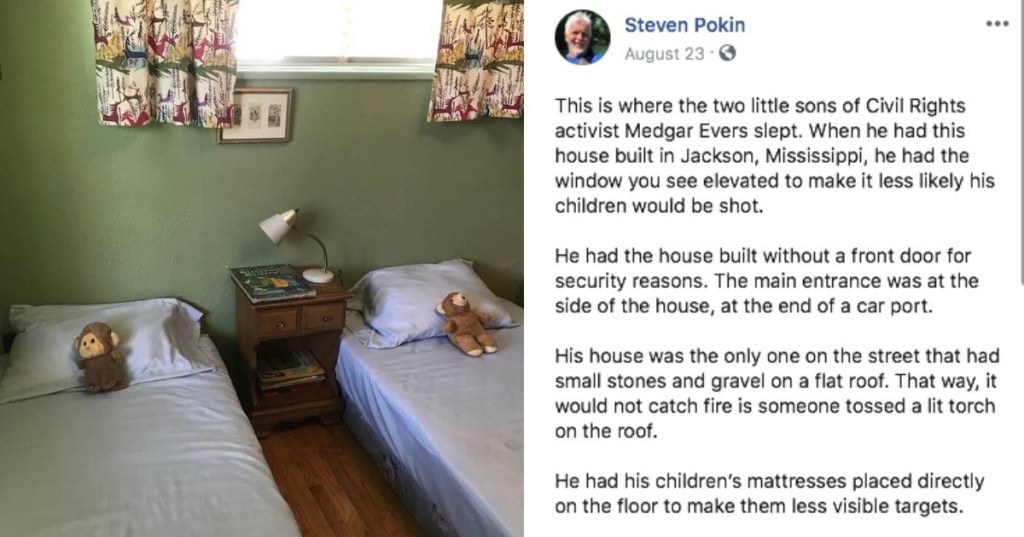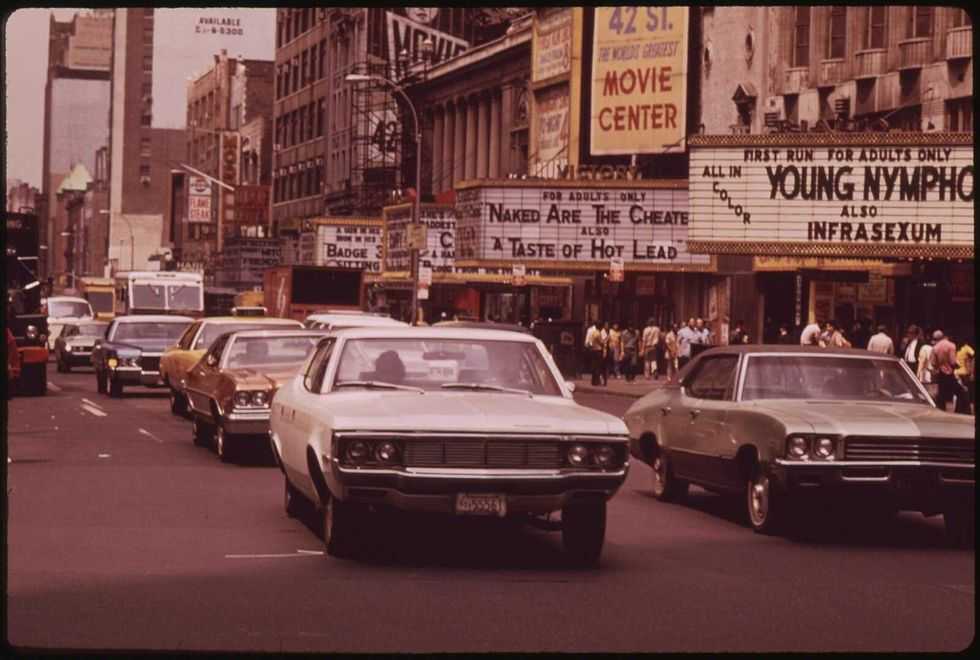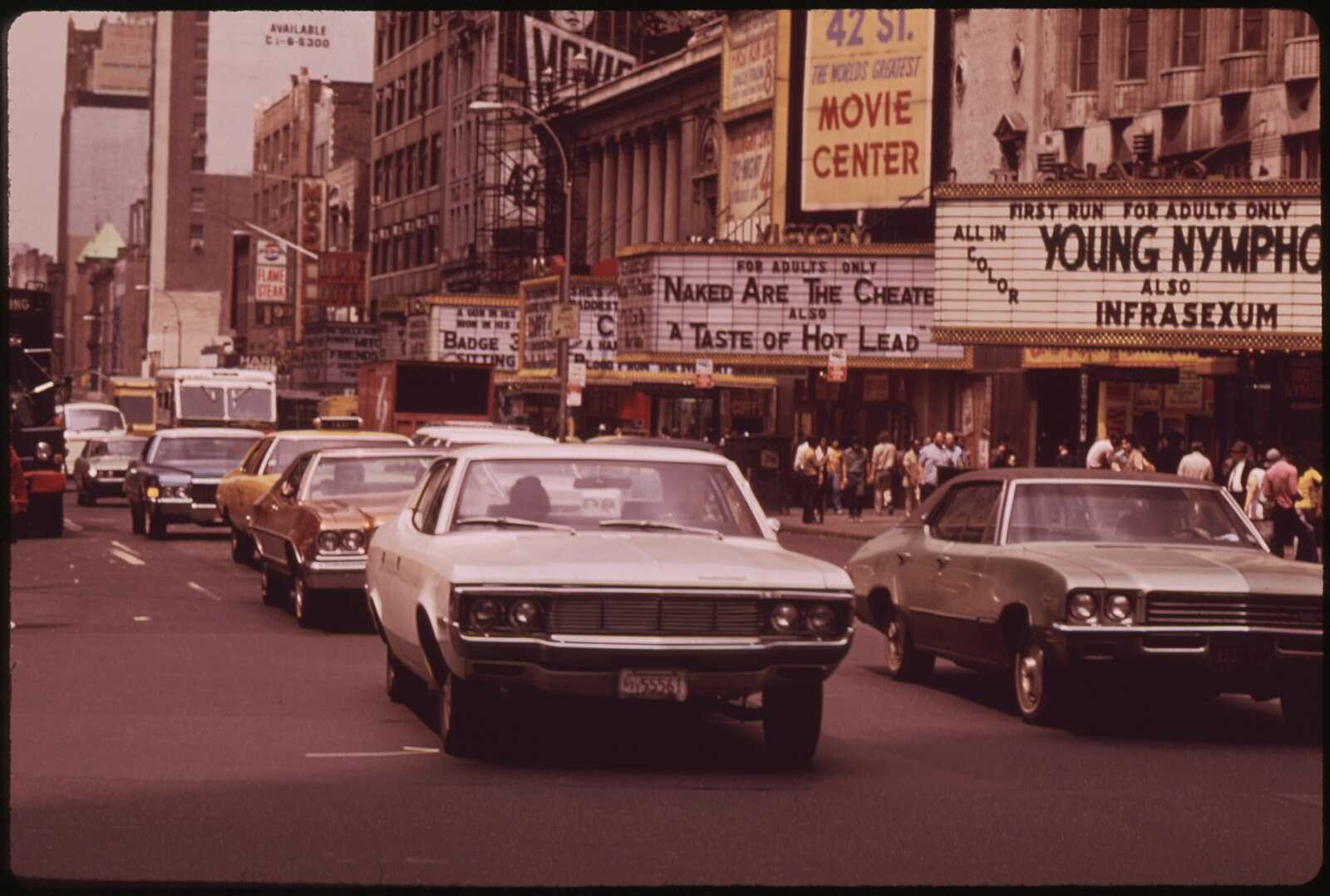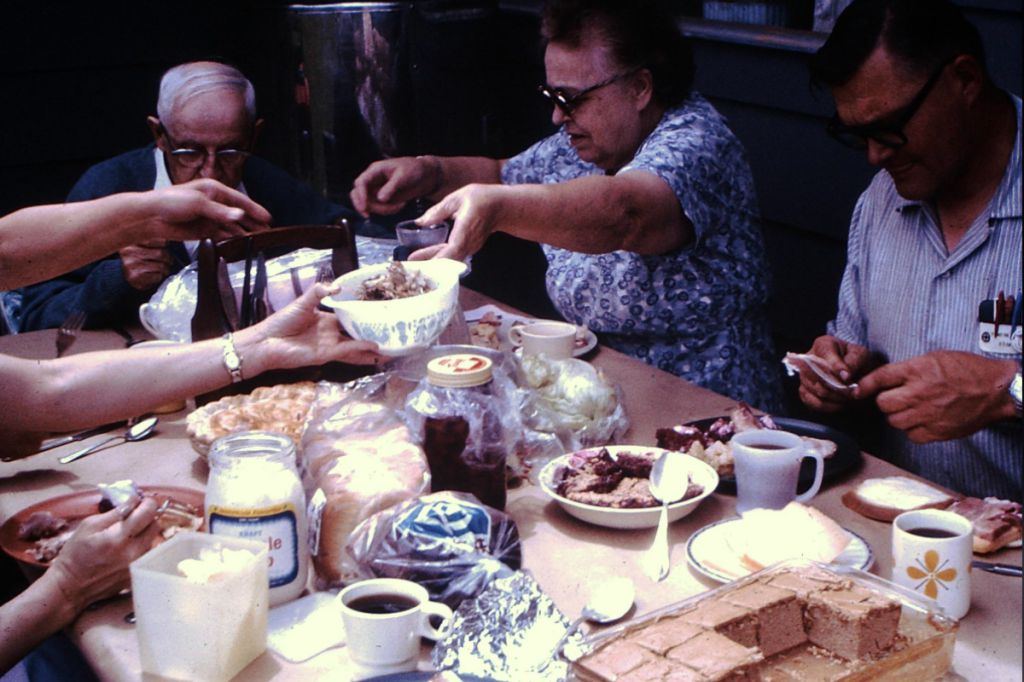After thinking I’d studied the Civil Rights Movement at least slightly more in depth than the average American, I’m embarrassed to say that Medgar Evers’ name didn’t ring a bell when I saw it. I’d probably heard or read his name at some point, but without enough detail about his life to stick in my brain—until now.
A post by Steven Pokin about his visit to Medgar Evers’ home in Jackson, Mississippi has captivated the attention of thousands, and put Evers’ story front and center in many people’s minds. And honestly, that’s where it should be. This hero of the Civil Rights Movement deserves to have his story told, remembered, and learned from.
RELATED: It’s Black Breastfeeding Week. Wondering why? One gut-punching poem says it all.
Pokin’s post shows a photograph of two twin-sized mattresses on the floor of a bedroom with stuffed animals resting on the pillows. It reads:
This is where the two little sons of Civil Rights activist Medgar Evers slept. When he had this house built in Jackson, Mississippi, he had the window you see elevated to make it less likely his children would be shot.
He had the house built without a front door for security reasons. The main entrance was at the side of the house, at the end of a car port.
His house was the only one on the street that had small stones and gravel on a flat roof. That way, it would not catch fire is someone tossed a lit torch on the roof.
He had his children’s mattresses placed directly on the floor to make them less visible targets.
He told his wife and children to sit on the floor while watching TV.In 1963, he was the NAACP’s first Mississippi field director. Three times that year, someone had fired into his home.
As a boy, he had witnessed the separate lynchings of a black man and a 10-year-old black boy — who had made the mistake of going to the whites-only county fair.
On June 10, he was not home when someone tried to enter through the rear door of his home. His wife moved the refrigerator to block the entry. They left the refrigerator there.
That week, President John Fitzgerald Kennedy spoke to the nation about civil rights, justice and a more perfect union. The President said it was coming and he asked the nation to give him time that, ultimately, he did not have.
Medgar Evers gave a speech in Jackson the night of June 11,1963. He returned home — to this home — lugging many T-shirts that he planned to give out at a rally the next day. They said: “Say No to Jim Crow.”
He was excited about the President’s speech.
He parked behind his wife’s car in the driveway and was almost in the car port when an assassin across the street shot him with a high-powered rifle.
No ambulance came.
A neighbor took him to the whites-only hospital. Doctors were unsure if they should treat him. They were out of “Negro blood” and feared they could lose their medical licenses if they used white blood to try to save a black man.
Then, a white doctor stepped in and said none of that mattered and worked valiantly to try to save the life of Medgar Evers, who had served this country at the invasion of Normandy.
He died about 40 minutes after being shot.
The bullet entered his back, came out his chest, went through a window, went through an interior wall leading to the kitchen and left a dent in the refrigerator.
I touched that dent today. Then, I went into the bedroom and saw the mattresses on the floor with the Teddy Bears on them.
I have never before felt history the way I felt it today.
After reading this post, I researched Medgar Evers a bit more. Not only is the tragic story of his assassination true, but it was another 31 years before his killer was brought to justice. It’s not that they didn’t know who the murderer was—it was that two all-white juries had deadlocked on whether or not to find him guilty.
Evers was murdered in 1963. That’s the year my mother graduated from high school, a mere 12 years before I was born. My grandmother, who is still alive, was 38. This is modern, recent history.
And it’s not like his assassination was a one-off fluke. He built his damn house with this very real possibility in mind. Can you imagine people shooting bullets into the house where you live with your children not once, not twice, but three times? Can you imagine your family having to watch TV on the floor because people wanted you dead simply for advocating for equal rights?
Too often, the dominant narrative of civil rights history downplays the violent, virulent backlash against it. We get the feel-good “I Have a Dream” speech and forget that Martin Luther King, Jr. was viewed by many as a dangerous radical. We celebrate the passage of the Civil Rights Act and forget that almost 100% of Senators and Representatives from the eleven former confederate states—both Republicans and Democrats—voted against it.
RELATED: The Martin Luther King quotes you’ve never heard because they shatter the sterilized version of him
And those people—both the ones who wanted civil rights leaders dead and the ones who voted against the legal rights for which they risked their lives—didn’t just miraculously change their minds on race simply because the law changed. Some may have had a change of heart over the years—it’s entirely possible—but not all. Some of those people are still alive today with kids and grandkids that they passed their racist hatred onto. Some of their descendants may have rejected their racism—some, but not all.
I see so many people claim that racism is no longer an issue in America—that people who bring up race and racism do so as a political talking point as opposed to a deeply ingrained reality affecting people’s daily lives. But two generations of my family who are still alive were grown adults when a white supremacist killed Medgar Evers. Two generations of my family who are still alive were adults when well-respected white supremacists (which should be an oxymoron, but wasn’t then) in the community covered for him. There’s no way we have weeded out that disease from our society when this is our modern history.
I mean, it hasn’t even been an entire lifetime since a decent percentage of white people would lose their mind if a black person used the same drinking fountain as them. We have video documentation of hotel owners pouring bleach into their swimming pools while black people swam in them because they performed the sin of putting their bodies into the same water that white people used.
How far do you have to dehumanize someone to refuse to touch the same water as them? How low do you have to consider black people that you think those who ask for equality deserve to be killed? That’s not just racial prejudice; it’s violent, racist hatred. It’s blatant white supremacy. And it wasn’t that long ago, America.
It just wasn’t that long ago.































